Fleurs du Mal Magazine


Or see the index
The Day is Done
The day is done, and the darkness
Falls from the wings of Night,
As a feather is wafted downward
From an eagle in his flight.
I see the lights of the village
Gleam through the rain and the mist,
And a feeling of sadness comes o’er me
That my soul cannot resist:
A feeling of sadness and longing,
That is not akin to pain,
And resembles sorrow only
As the mist resembles the rain.
Come, read to me some poem,
Some simple and heartfelt lay,
That shall soothe this restless feeling,
And banish the thoughts of day.
Not from the grand old masters,
Not from the bards sublime,
Whose distant footsteps echo
Through the corridors of Time.
For, like strains of martial music,
Their mighty thoughts suggest
Life’s endless toil and endeavor;
And to-night I long for rest.
Read from some humbler poet,
Whose songs gushed from his heart,
As showers from the clouds of summer,
Or tears from the eyelids start;
Who, through long days of labor,
And nights devoid of ease,
Still heard in his soul the music
Of wonderful melodies.
Such songs have power to quiet
The restless pulse of care,
And come like the benediction
That follows after prayer.
Then read from the treasured volume
The poem of thy choice,
And lend to the rhyme of the poet
The beauty of thy voice.
And the night shall be filled with music,
And the cares, that infest the day,
Shall fold their tents, like the Arabs,
And as silently steal away.
Henry Wadsworth Longfellow
More in: Archive K-L, Longfellow, Henry Wadsworth

Ebenezer Jones
(1820-1860)
Remembrance of Feelings
Oh! never may the heart regain
Past feelings, as the mind may thought;
Departed joy leaves dreariest pain,
But memory of its nature!–nought:
Then cease remembrance to reprove;
I shall forget, alas! too soon,
Not that you gave me leave to love,
But what, the heaven, that was that boon.
I shall forget,–nay! World’s alone!
I shall remember, with dark fear,
With self disgust at all that’s known,
With self-despair’s most lying sneer,–
That this life loved you, and that then
Its ramifacations shot through heaven;
And thrilled with measureless rapture, when
Thereby heaven’s bliss to you seemed driven.
I shall remember I was pure;
Fearlessly loving, ever, the whole;
Sure that eternity’s obscure,
All paradised bright stars did roll,
That bearing you, there I might soar,
The joy in your cheek still wildly eyeing,
Its happiness light yet deepening more,
The more my strength rose, heaven defying.
I shall remember each love scene,
From love’s first dawn, to this wild end;
Your deepening clasp, your rapturous mien,
The murmuring sounds your heart did send;–
Take, take his jewels from your brow;
Bend, if your heart be not cold stone;
And I will whisper to you now,
What the forgettings that I moan.
I shall forget what was that heaven,
Through which my loving life did spread;
I shall forget the bliss me given,
When it seemed you through that heaven I led;
I shall forget how feel the pure,
Though remembering their bliss divine;
How pulsed the life yours did immure,
Though remembering that life was mine.
And these forgetting, all beside
In life, will darken deepening gloom;
The world of these deprived, denied,
Will seem to surge, a reeking tomb;
Such darkness may be truth, but when
We loved, how different dreamed this heart;
Might I recall love’s feelings, then
Perchance the dream might not depart.
Then cease remembering to reprove;
I shall forget, alas! too soon,
Not that you gave me leave to love,
But what, the heaven, that was that boon.
Would, lady! that the heart could gain
Past feelings, as the mind may thought;
The hours might then give up their pain,
And be with memoried raptures fraught.
Ebenezer Jones poetry
fleursdumal.nl magazine
More in: Archive I-J, CLASSIC POETRY
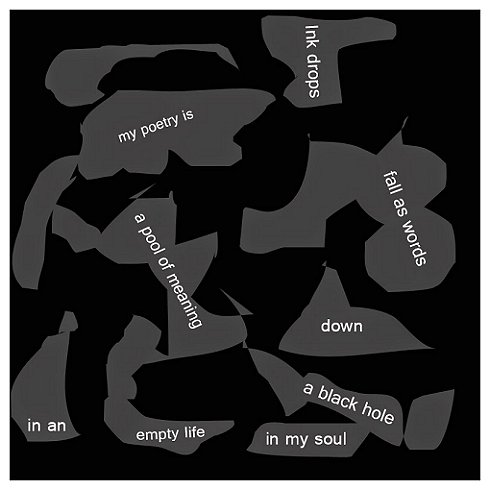
Mathias Jansson: Abstract Word Poem “Ink drops…”
Mathias Jansson is a Swedish art critic and poet. He has contributed with visual poetry to magazines as Lex-ICON, Anatematiskpress, Quarter After #4 and Maintenant 8: A Journal of Contemporary Dada. He has also published a chapbook at this is visual poetry and contributed with erasure poetry to anthologies from Silver Birch Press.
Homepage: http://mathiasjansson72.blogspot.se/ and http://wordshavenoeyes.blogspot.se/
fleursdumal.nl magazine
More in: *Concrete + Visual Poetry F-J, Jansson, Mathias, Mathias Jansson, Mathias Jansson, Visual & Concrete Poetry
B e r t
B e v e r s
Asverstrooiing
Hoe van mij als grote broer
verwacht werd dat ik van ons pa
de as verstrooien zou. Ik weet
ons daar nog samen. Alleen.
Hij was nog meer dan ik van hem
verwachtte en liet zich door een
ferme ruk van oostenwind verspreiden.
Over mijn broek.
Over mijn schoenen.
Over mijn zin.
En van ons weg.
Bert Bevers
(uit Onaangepaste tijden, Uitgeverij Zinderend, Bergen op Zoom, 2006)
fleursdumal.nl magazine
More in: Archive A-B, Bevers, Bert

Don[ald Robert Perry] Marquis
(1878-1937)
“They Had No Poet . . .”
“Vain was the chief’s, the sage’s pride!
They had no poet and they died.” — POPE.
BY TIGRIS, or the streams of Ind,
Ere Colchis rose, or Babylon,
Forgotten empires dreamed and sinned,
Setting tall towns against the dawn,
Which, when the proud Sun smote upon,
Flashed fire for fire and pride for pride;
Their names were . . . Ask oblivion! . .
“They had no poet, and they died.”
Queens, dusk of hair and tawny-skinned,
That loll where fellow leopards fawn . . .
Their hearts are dust before the wind,
Their loves, that shook the world, are wan!
Passion is mighty . . . but, anon,
Strong Death has Romance for his bride;
Their legends . . . Ask oblivion! . . .
“They had no poet, and they died.”
Heroes, the braggart trumps that dinned
Their futile triumphs, monarch, pawn,
Wild tribesmen, kingdoms disciplined,
Passed like a whirlwind and were gone;
They built with bronze and gold and brawn,
The inner Vision still denied;
Their conquests . . . Ask oblivion! . . .
“They had no poet, and they died.”
Dumb oracles, and priests withdrawn,
Was it but flesh they deified?
Their gods were . . . Ask oblivion! . . .
“They had no poet, and they died.”
Don Marquis poetry
fleursdumal.nl magazine
More in: Archive M-N, CLASSIC POETRY

Ode
Aan jou opdragen, op onze drempel
van verstomming, een ode met woorden
die jou betovert, wil ik je gezel
naast mijn vermommingen zijn, openheid
aan jou tonen, toch verzand ik laf in
mijn opzet, ontluik jij, warm en bereid
maar zie ik haar voor mij in het begin
van een morgen, hoe ze mij bekoorde
zich naakt en koel van mij wendde, en ging
met de zon die binnen schoof op bussels
stof, de deur geruisloos open gleed, de
drempel sleets vertreden met mijn odes
Niels Landstra
fleursdumal.nl magazine
More in: Archive K-L, Landstra, Niels
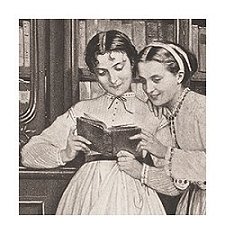
One Year ago
One Year ago — jots what?
God — spell the word! I — can’t —
Was’t Grace? Not that —
Was’t Glory? That — will do —
Spell slower — Glory —
Such Anniversary shall be —
Sometimes — not often — in Eternity —
When farther Parted, than the Common Woe —
Look — feed upon each other’s faces — so —
In doubtful meal, if it be possible
Their Banquet’s true —
I tasted — careless — then —
I did not know the Wine
Came once a World — Did you?
Oh, had you told me so —
This Thirst would blister — easier — now —
You said it hurt you — most —
Mine — was an Acorn’s Breast —
And could not know how fondness grew
In Shaggier Vest —
Perhaps — I couldn’t —
But, had you looked in —
A Giant — eye to eye with you, had been —
No Acorn — then —
So — Twelve months ago —
We breathed —
Then dropped the Air —
Which bore it best?
Was this — the patientest —
Because it was a Child, you know —
And could not value — Air?
If to be “Elder” — mean most pain —
I’m old enough, today, I’m certain — then —
As old as thee — how soon?
One — Birthday more — or Ten?
Let me — choose!
Ah, Sir, None!
Emily Dickinson
January 1, 2015
HAPPY NEW YEAR!
fleursdumal.nl magazine
More in: Archive C-D, Dickinson, Emily
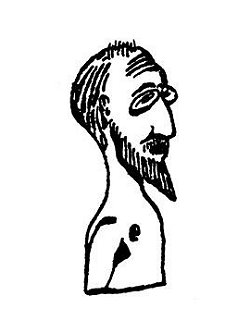
Erik Satie
(1866 – 1925)
Le Réveil de la Mariée
Arrivée du cortège.
Appels.
Levez-vous !
Guitares faites avec de vieux chapeaux.
Un chien danse avec sa fiancée.
16 mai 1914
Erik Satie Le Réveil de la Mariée
fleursdumal.nl magazine
More in: Archive S-T, Erik Satie, Satie, Erik

Ben Jonson
(1573-1637)
Come, My Celia
Come, my Celia, let us prove
While we may, the sports of love;
Time will not be ours forever;
He at length our good will sever.
Spend not then his gifts in vain.
Suns that set may rise again;
But if once we lose this light,
‘Tis with us perpetual night.
Why should we defer our joys?
Fame and rumor are but toys.
Cannot we delude the eyes
Of a few poor household spies,
Or his easier ears beguile,
So removed by our wile?
‘Tis no sin love’s fruit to steal;
But the sweet theft to reveal.
To be taken, to be seen,
These have crimes accounted been.
Ben Jonson poetry
fleursdumal.nl magazine
More in: Archive I-J, CLASSIC POETRY
B e r t
B e v e r s
Caleidoscoop
Bij de grafiek van Gerrit Westerveld
Rustig drukker duwt hij zijn vormen
papier op geestdriftig in wachtende kleuren.
Alle lagen zijn hem hiervan even lief.
Hij plet ze zacht totdat het vierkant staat.
Dit werk kent slechts zijn eigen normen,
tolt zich de blik in als draaiende deuren
gelijk open in een waaierend perspectief
en gesloten als een kermis bij dageraad.
Bert Bevers
(uit Onaangepaste tijden, Uitgeverij Zinderend, Bergen op Zoom, 2006)
fleursdumal.nl magazine
More in: Archive A-B, Bevers, Bert
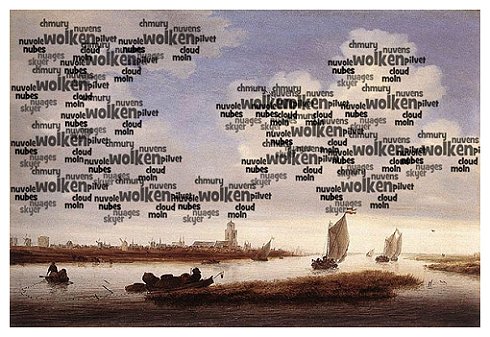
Mathias Jansson: Multi-language cloud-painting after Salomon van Ruisdael, “View of Deventer Seen from the North-West” (1657)
Mathias Jansson is a Swedish art critic and poet. He has contributed with visual poetry to magazines as Lex-ICON, Anatematiskpress, Quarter After #4 and Maintenant 8: A Journal of Contemporary Dada. He has also published a chapbook at this is visual poetry and contributed with erasure poetry to anthologies from Silver Birch Press.
Homepage: http://mathiasjansson72.blogspot.se/ and http://wordshavenoeyes.blogspot.se/
fleursdumal.nl magazine
More in: *Concrete + Visual Poetry F-J, Jansson, Mathias, Mathias Jansson, Mathias Jansson, Visual & Concrete Poetry
Emma Crebolder’s bundel Verzoenen (2014) heeft een ‘ lekker stoute’ ondertoon net als haar bundels Vallen (2010) en Vergeten (2010). Deze drie titels stralen samen een ouderdomsproblematiek uit. Zo ’n thema is echter een te voor de hand liggende gemene deler. Er zit veel meer in deze bundels, want er heerst namelijk een erotische geladenheid die je als lezer niet vanzelfsprekend verwacht. Crebolder vrijt talig bij voorkeur in de zee en met grote ogen gericht op andere levende wezens zoals een aardworm, eekhoorns, naaktslakken en chimpansees.
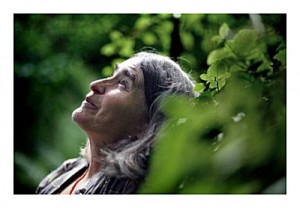 De verandering van naam zodra een vrouw in het huwelijk treedt is iets waar ook zij zich mee moest verzoenen als vrouw van haar tijd. Een naamsverandering is een talige en soms dramatische ingreep in het privé leven waar mannen zich weinig bij kunnen voorstellen. Crebolder verzoent zich hier heel verleidelijk mee. Ze schrijft op p.27 in Verzoenen:
De verandering van naam zodra een vrouw in het huwelijk treedt is iets waar ook zij zich mee moest verzoenen als vrouw van haar tijd. Een naamsverandering is een talige en soms dramatische ingreep in het privé leven waar mannen zich weinig bij kunnen voorstellen. Crebolder verzoent zich hier heel verleidelijk mee. Ze schrijft op p.27 in Verzoenen:
Door aanhuwen werd ik verdoopt
zoals mijn moeder en haar moeder
andermans naam gingen dragen.
Ik leef met de naam, lig erop, hang
hem over mijn schouders, verleid
hem zich thuis te voelen.
Ook in Vergeten (eerste bundel in deze serie, p.13) schreef ze al:
… Wat we verloren raakten is
geen naam, het zijn bijeengedreven veren.
Er hoort een woord omheen dat zit als
een condoom, strak denk ik. Ruim voorin.
Hoe erotisch, hoe seksueel kan een naam zijn – verzoening met haar eigen naam maar ook het terugvinden van vergeten namen. Verleiding is een merkteken van Crebolder. Waar wil je een betere “pick up line” vinden dan in de volgende regel uit Vergeten (p.45)?:
Wat moet ik je geven om je aan
mij uit te lenen?
In het slot van hetzelfde gedicht zijn de chimpansees een metafoor voor haar en haar gerenommeerde metgezel als ze zich herinnert:
Later zou het vlooien beginnen
en het tuiten van de lippen.
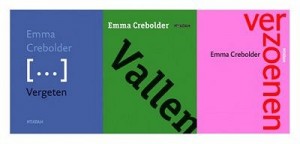 Eerder in Vergeten beschrijft Crebolder de naaktslakken als obscene kronkeltuigen die haar Oost-Indische kers vreten. Even aards gaat het eraan toe in de jongste bundel Verzoenen. Ze schrijft dat ze bij een aardworm wil liggen om goed voor eeuwig te kunnen slapen. In de wereld van de oudjes zag ze dat een kus als een hommel tegen een raam aan vliegt. Ze roept iedereen op hun kikkervisjes te delen. Ze hoort een meerkoet blurb (een van vele neologismen in haar woordenschat), terwijl de wind in de populieren jachtig tekeer gaat. Parende eekhoorns in Vallen worden in haar ogen spookacrobaten waar alleen zij van weet, maar die ze nooit zag. Crebolder beschrijft deze onderbuik activiteiten in de dierenwereld als getuigschriften.
Eerder in Vergeten beschrijft Crebolder de naaktslakken als obscene kronkeltuigen die haar Oost-Indische kers vreten. Even aards gaat het eraan toe in de jongste bundel Verzoenen. Ze schrijft dat ze bij een aardworm wil liggen om goed voor eeuwig te kunnen slapen. In de wereld van de oudjes zag ze dat een kus als een hommel tegen een raam aan vliegt. Ze roept iedereen op hun kikkervisjes te delen. Ze hoort een meerkoet blurb (een van vele neologismen in haar woordenschat), terwijl de wind in de populieren jachtig tekeer gaat. Parende eekhoorns in Vallen worden in haar ogen spookacrobaten waar alleen zij van weet, maar die ze nooit zag. Crebolder beschrijft deze onderbuik activiteiten in de dierenwereld als getuigschriften.
Dezelfde verholen onderbuik gevoelens draagt ze over op de vormen van wolken, een losgeslagen tak en zelfs op de wind in Verzoenen, p.11:
Zoals bij het verholen vrijen
de contouren wijken, dijen
de lijnen uit…
Een van de laatste gedichten in Vergeten op p. 53 is ultiem erotisch. Le petit mort dringt tijdens de climax door tot in de oogballen van het vrijende paar. De ontnuchtering is zo na aan de roes.
… We schuiven als paar in
elkaar tot de oogbol verschiet. Terwijl
het nog zacht nasneeuwt onder ons vel
ligt het juk al klaar. Misleid zijn we wel.
In alle drie de bundels zijn de laatste gedichten op pagina vijf en vijftig. Het slotgedicht in Vallen gaat ook over verleiding en vooral over de onverwachte vormen van verleiding. Dit resoneert door de bundel.
Het wordt niet neervallen
maar paarsgewijs wentelen.
Uiteindelijke is het vooral de stem van de zee die alle taalvermogens waarover Crebolder beschikt, uitdaagt. De zee is er bij eb en de zee is er bij vloed. Zwem- en waterbeelden stromen door deze bundels. In Vergeten (p.41) herinnert ze zich hoe het is om als kind in de zee te zwemmen:
De zee weet niet wat ze met ons deed.
Ze spreidt een waaier van schuim
over ons. We bewegen als kikkers
in haar.
Het is alsof de zee haar alfa en omega is. Cyclussen als getijden, geboorte en dood, dat zijn de ijkpunten van de liefde uit de zee die overgaat op het land in Verzoenen (p. 19):
Zeezout heb ik ingenomen
en watervruchten afgepeld.
In zeewier ben ik verzonken
toen langszij kleine vissen
onverstoorbaar verder zwommen.
Vanuit mijn vooronder kan ik nu
eindelijk het verre bovenlicht begroeten.
En ergens verholen zoekt nog één tentakel na haar verholen schacht. De dood kondigt zich aan op p.49. Misschien als een herinnering aan de oorsprong?
Definitief de zee in lopen
en vervluchtigen in de geliefde.
Dit gedicht doet me denken aan Ingrid Jonker die doodongelukkig in de liefde de zee inliep bij Drieankerbaai. Zij was een talentvolle Afrikaanstalige dichter en stierf voortijdig op 35-jarige leeftijd. Bij Crebolder is het echter geen wanhoopsdaad. Nee. Bij haar wordt de liefde verzoend met het zout; is liefde, is erotiek een vorm van verzilting.
…Mijn uitvaart
stel ik me soms zo voor.
…Aan scherven verwond ik me.
Ik kom. Zijn zout zal me genezen.
Niet alle erotische verwijzingen in haar laatste drie bundels zijn hiermee besproken. De liefdevolle energie en vitaliteit siddert na om haar te voeren naar weer nieuwe getijden met “de oude zee verderop” die nog steeds “in vloeiende zinnen” spreekt. Crebolder opponeert met hartstocht het contrapunt van het leven: niet een “sadder but wiser girl”, maar vrolijk ‘wiser and wetter’.
Carina van der Walt
Carina Van der Walt: Erotiek in de poëzie van Emma Crebolder. Fotoportret van Emma Crebolder door Carina van der Walt (2014)
fleursdumal.nl magazine
More in: Archive C-D, Archive W-X, Carina van der Walt, Crebolder, Emma, Walt, Carina van der
Thank you for reading Fleurs du Mal - magazine for art & literature